
Architecture and Culture
Scope & Guideline
Advancing Interdisciplinary Insights in Built Environments
Introduction
Aims and Scopes
- Cultural Interpretations of Architecture:
The journal frequently publishes works that analyze architectural forms and spaces through cultural lenses, exploring how cultural narratives and identities are embedded within the built environment. - Interdisciplinary Approaches:
Research often employs interdisciplinary methodologies, integrating insights from sociology, anthropology, history, and art theory to enrich the understanding of architecture's role in society. - Contemporary Issues in Architecture:
There is a strong emphasis on contemporary themes such as urbanism, sustainability, social justice, and the impact of globalization on architectural practices. - Historical Perspectives:
The journal also addresses historical contexts, examining how past architectural practices inform current trends and societal challenges, thus bridging historical inquiry with contemporary discourse. - Spatial Justice and Welfare:
A consistent focus is placed on architecture's role in promoting social welfare and justice, highlighting how spatial configurations can affect social equity and community well-being.
Trending and Emerging
- Intersectionality in Architecture:
A growing body of work is examining how architecture intersects with issues of gender, race, and class, highlighting the importance of inclusive design practices that cater to diverse populations. - Sustainability and Resilience:
Recent publications increasingly address sustainability, exploring how architectural practices can contribute to environmental resilience and climate adaptation in urban settings. - Digital and Technological Innovations:
There is an emerging interest in the impact of digital technologies on architecture, including discussions around smart cities, digital fabrication, and the role of virtual spaces in contemporary life. - Socially Engaged Architecture:
Research focusing on socially engaged practices is on the rise, emphasizing participatory design processes and the role of architecture in fostering community involvement and activism. - Global Perspectives on Urbanization:
The journal is seeing an increased focus on global urbanization trends, examining how architecture responds to the challenges posed by rapid urban growth, particularly in the Global South.
Declining or Waning
- Traditional Architectural Styles:
There is a noticeable decrease in the exploration of traditional architectural styles and their preservation, as contemporary discussions increasingly favor innovative and adaptive design practices. - Rural Architecture Studies:
Research focusing on rural architecture and its socio-cultural implications has diminished, possibly overshadowed by the more pressing issues of urbanization and metropolitan development. - Formalism in Architectural Design:
The journal has shifted away from purely formalist analyses of architecture, indicating a move towards more contextual and relational understandings of space, which prioritize social and cultural factors over aesthetic considerations. - Architectural Theory without Practice:
Theoretical explorations that do not engage with practical applications in real-world contexts are less frequent, suggesting a trend towards research that emphasizes actionable outcomes and community engagement. - Architectural Heritage and Conservation:
There appears to be a waning interest in the topic of architectural heritage conservation, with fewer articles focusing on the preservation of historical sites in favor of discussions surrounding contemporary architectural innovations.
Similar Journals

Boletin Academico-Revista de Investigacion y Arquitectura Contemporanea
Pioneering Research at the Intersection of Art and Architecture.Boletin Academico-Revista de Investigacion y Arquitectura Contemporanea is a distinguished journal published by SIELAE & UNIV CORUNA, Fac Filologia, focusing on the interconnectivity of contemporary architecture, cultural studies, and visual arts. With an E-ISSN of 2173-6723, this open-access publication serves as an essential resource for researchers, academics, and professionals eager to explore innovative perspectives and methodologies in these dynamic fields. Spanning a commendable period from 2016 to 2023, the journal demonstrates a strong academic footprint, ranked in the Q2 category for both Architecture and Cultural Studies, and holds a prestigious Q1 ranking in Visual Arts and Performing Arts. With Scopus rankings reflecting its growing influence—particularly in Visual Arts and Architecture—Boletin Academico delivers a platform that is not only academically rigorous but also culturally relevant, encouraging discourse that shapes the future of contemporary architectural and artistic practices. The journal’s commitment to open access further enhances its appeal, ensuring that groundbreaking research is readily available to an extensive audience.

ArcHistoR-Architecture History Restoration
Preserving Heritage, Inspiring InnovationArcHistoR-Architecture History Restoration is an esteemed open-access journal published by UNIV MEDITERRANEA REGGIO CALABRIA since 2014, focused on the multifaceted domains of architecture, history, and visual arts. This journal serves as a vital platform for the dissemination of research findings, innovative methodologies, and critical discussions surrounding the restoration and history of architectural practices, appealing to a diverse audience of researchers, professionals, and students in these fields. With a commitment to scholarly excellence, ArcHistoR has positioned itself within the academic community, reflected in its ranking in the 2023 category quartiles, where it secured Q4 in Architecture and Q3 in both History and Visual Arts and Performing Arts. The journal facilitates global collaboration and knowledge sharing in its areas of expertise, further underscoring its relevance and significance. Based in Italy, effective communication and cooperation in the restoration community can flourish through the journal's purview. For those dedicated to expanding their understanding and contributing to the discourse on architectural history and restoration, ArcHistoR is an invaluable resource.
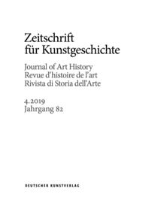
ZEITSCHRIFT FUR KUNSTGESCHICHTE
Engaging Minds Through Artistic InquiryZEITSCHRIFT FUR KUNSTGESCHICHTE is a prestigious journal dedicated to the study of art history, offering insightful analyses and discussions that enrich the understanding of visual arts and performing arts. Published by DEUTSCHER KUNSTVERLAG GMBH in Germany, this journal has established itself as a significant platform for researchers and professionals alike since its inception. With a print ISSN of 0044-2992 and an e-ISSN of 2569-1619, it spans a comprehensive range of topics in art history, reflecting both traditional and contemporary perspectives. Although categorized in the Q4 quartile for Visual Arts and Performing Arts, the journal contributes to a rich dialogue within its field, aiming to foster academic discourse and promote scholarly research. Its scope has evolved notably from converged years starting in 1975 and gathering strength from 2001 to 2024, and it is committed to serving as an essential resource for students, academics, and practitioners in the arts. While not offering open access, the journal maintains a rigorous peer-review process to ensure high-quality submissions that advance knowledge and stimulate critical thought.

ARCHITECTURAL RECORD
Cultivating Critical Perspectives in the Built EnvironmentARCHITECTURAL RECORD, published by McGraw Hill Inc, stands as a vital resource in the field of architecture and design, offering insightful perspectives and critical analyses that cater to architects, designers, and academia alike. With an ISSN of 0003-858X, this prestigious journal has been a cornerstone for the architectural community, providing a blend of contemporary practices and theoretical frameworks since its inception. Although it is not currently available through Open Access, its rich content contributes to the ongoing dialogue in both the Visual Arts and Performing Arts, as well as Engineering and Architecture disciplines. The journal's historical impact can be seen through its wide readership and influence in shaping architectural discourse, making it a highly regarded publication for professionals and students in the field. As a beacon of innovative practices, ARCHITECTURAL RECORD continues to inspire and educate, even despite its coverage discontinuation in Scopus since 2018.
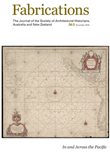
Fabrications-The Journal of the Society of Architectural Historians Australia and New Zealand
Fostering Dialogue on Architectural History and Cultural HeritageFabrications - The Journal of the Society of Architectural Historians Australia and New Zealand is a vital scholarly platform that explores the rich interplay between architecture and its historical context within the Australasian landscape. Published by Routledge Journals, Taylor & Francis Ltd, this journal serves as a crucial resource for researchers, professionals, and students in the fields of architectural history, urban studies, and visual arts. With an ISSN of 1033-1867 and an E-ISSN of 2164-4756, Fabrications has received recognition for its quality, placing in the Q4 category in Urban Studies and Q2 in Visual Arts and Performing Arts as of 2023. This journal not only welcomes innovative research articles but also encourages the exploration of New Zealand and Australian cultural heritage through diverse architectural narratives. With publications spanning significant years since its inception in 1989, Fabrications continues to provide an open forum for dialogue and discovery, catering to the academic and professional community's growing interest in architectural narratives through a regional lens.

Prostor
Shaping the Future of Spatial Studies TogetherProstor is an esteemed scholarly journal published by the University of Zagreb, Faculty of Architecture, dedicated to advancing knowledge in the fields of architecture, urban planning, and spatial studies. Since transitioning to an Open Access model in 2006, Prostor has made significant strides in providing unrestricted access to its contents, fostering a vibrant community of researchers, practitioners, and students interested in contemporary issues surrounding the built environment and social space. The journal's commitment to quality is reflected in its impressive rank within Scopus, particularly in the Arts and Humanities category (64th percentile) and within Engineering (Architecture) at the 49th percentile. Covering a broad array of interdisciplinary topics, Prostor serves as a vital platform for disseminating innovative research and fostering dialogue among professionals while engaging with practical and theoretical explorations of spatial design. With coverage spanning over two decades, Prostor remains a crucial resource for anyone seeking to navigate the complexities of architecture and urban studies.
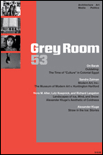
Grey Room
Unveiling Cultural Narratives Through Built EnvironmentsGrey Room is a distinguished peer-reviewed academic journal published by MIT Press, focusing on interdisciplinary discussions at the intersection of architecture, communication, sociology, political science, and the visual and performing arts. Established in 2002, the journal has carved out a critical space for exploring the links between built environments and cultural narratives, engaging a diverse readership of researchers, professionals, and students. With an impact factor reflecting its contribution to these fields, it is recognized for fostering innovative dialogue and scholarship. Although it operates without an open access model, Grey Room continues to thrive in the academic community, particularly as it moves towards converged years spanning from 2002 to 2024. The journal's categorization into various quartiles highlights its relevance and ongoing commitment to contemporary issues. Readers can expect thought-provoking articles that challenge conventional boundaries of practice and scholarship, making Grey Room an essential resource for those interested in the dynamic interplay of architecture and culture.

Bulletin KNOB
Empowering Research, Enriching CultureBulletin KNOB, published by the KONINKLIJKE NEDERLANDSE OUDHEIDKUNDIGE BOND-KNOB, is a reputable Open Access journal that has been disseminating knowledge since 1899, with a continued commitment to making research accessible to all. Based in the Netherlands, this journal provides a platform for scholarly articles that span the fields of Conservation, History, and the Visual Arts and Performing Arts. With its 2023 Scopus rankings placing it in the top quartiles within its category, Bulletin KNOB is recognized for its significant contribution to the advancement of these disciplines. Researchers, professionals, and students alike are encouraged to engage with the journal's diverse content that bridges historical narratives with contemporary practices, fostering a deeper understanding of cultural heritage. The journal’s commitment to excellence is further reflected in its Q3 and Q4 quartile rankings, making it an essential resource for anyone dedicated to the study of the arts and humanities.
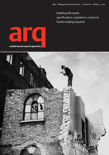
arq-Architectural Research Quarterly
Advancing Architectural Discourse Through Rigorous Researcharq-Architectural Research Quarterly, published by Cambridge University Press, is a leading journal in the fields of architecture, visual arts, and performing arts. With an ISSN of 1359-1355 and an E-ISSN of 1474-0516, the journal has successfully captured the essence of architectural research since its inception in 1995. Recognized for its rigorous academic contributions, it currently holds a Q4 quartile in Architecture and a Q3 quartile in Visual Arts and Performing Arts as of 2023, reflecting its commitment to advancing knowledge within these disciplines. While it does not offer Open Access, it remains a crucial resource for scholars, professionals, and students seeking to explore innovative ideas and practices in architecture and the arts. The journal features a diverse range of articles that foster interdisciplinary dialogue, making it an indispensable platform for those interested in shaping the future of architectural discourse.
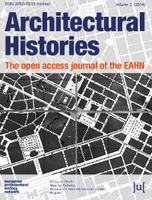
Architectural Histories
Advancing Critical Discourse in Architectural HistoryArchitectural Histories is a leading open-access journal published by UBIQUITY PRESS LTD since 2013, dedicated to the exploration and critique of architectural history. With an ISSN of 2050-5833 and an esteemed presence in the United Kingdom, the journal has gained notable recognition in various disciplines, achieving a Q2 ranking in Architecture, a Q1 ranking in History, and a Q1 ranking in Visual Arts and Performing Arts for 2023. It stands out with impressive Scopus ranks, placing it within the 79th percentile for Visual Arts and Performing Arts. The journal's scope emphasizes interdisciplinary approaches to architectural history, engaging researchers, professionals, and students alike in critical discourse. By providing a platform for innovative research and scholarly dialogue, Architectural Histories significantly contributes to the understanding of architecture's past and its implications for present and future practices, marking its importance in the academic community.